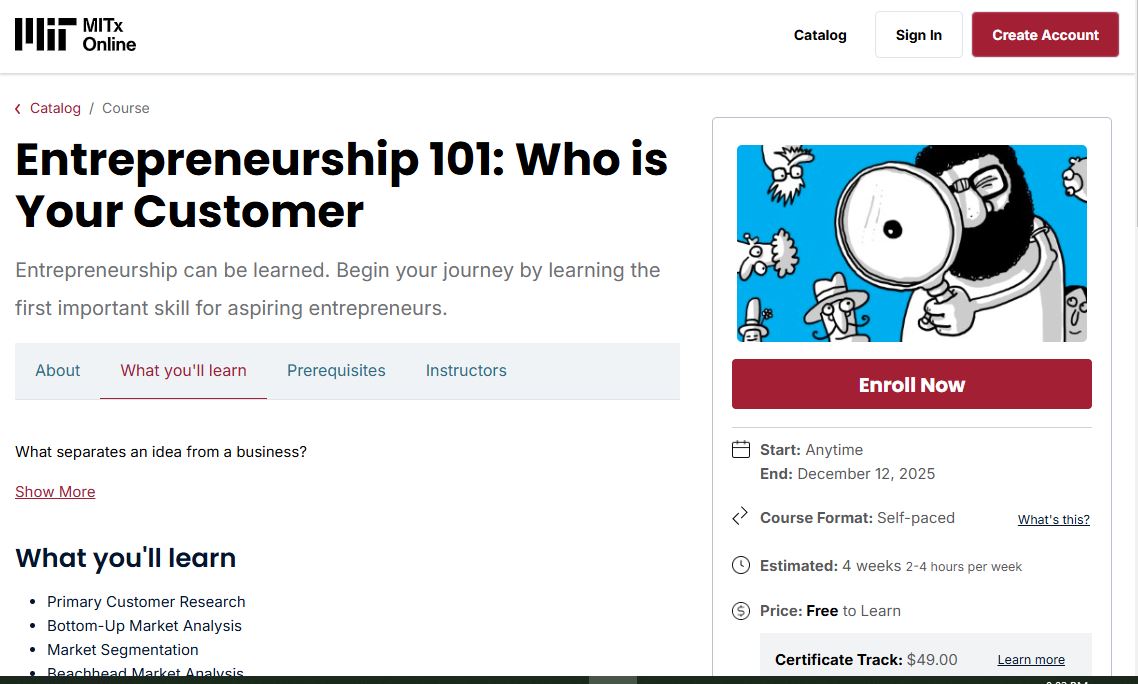Want to be your own boss? Work from anywhere? Make money online? Sounds pretty awesome, right? Well, with the help of online courses, becoming an online entrepreneur is more achievable than ever.
Think of it like this, you’re learning a new skill, like playing an instrument or coding. You wouldn’t just jump in without any guidance, would you? Online courses are like your instructors for the world of online business. They provide structure, expert advice, and a clear path to follow.
This blog post is your ultimate guide to navigating the world of online entrepreneurship courses for beginners. We’re going to break down everything you need to know, including:
What kind of courses are out there: From e-commerce to freelancing, we’ll explore different avenues and the courses that can get you started.
How to choose the right course for you: We’ll give you tips on what to look for, how to avoid scams, and how to find courses that fit your budget and learning style.
What you’ll actually learn: We’ll highlight the key skills you’ll gain, like marketing, sales, and building an online presence.
So, if you’re ready to take the first step towards building your own online business, you’ve come to the right place. Let’s dive in and explore the exciting world of online entrepreneurship education.

How To Choose Online Entrepreneurship Course For Beginners
Starting your entrepreneurial journey can be exciting, but with so many options available choosing the right course can be a challenge. It’s important to pick a course that fits your goals, learning style, and budget. The right course can set you on the path to success. Consider these five key factors to consider when selecting an online entrepreneurship course for beginners.
Define Your Goals
Before you even start browsing courses, take some time to figure out what you want to achieve. What kind of online business are you dreaming of? An e-commerce store selling handmade jewelry? A dropshipping business focused on trendy gadgets? A freelance writing career? Maybe you want to offer online coaching services? Once you have a clear picture of your ideal business, you can choose a course that directly aligns with your aspirations and helps you develop the specific skills you need.
Course Content and Structure
The content and structure of a course are crucial. Does the course cover the specific skills and knowledge you need to achieve your business goals? Look for courses that go beyond just theory. Do they include hands-on projects, case studies, or real-world exercises? These will help you put your learning into action and gain practical experience. Also, consider the course structure. Is it self-paced, allowing you to learn at your own convenience, or is it structured with deadlines? Choose a format that best suits your learning style and schedule.
Instructor Expertise and Credibility
Who is teaching the course? Do they have real-world experience in the field? Have they successfully built their own online businesses? Learning from successful entrepreneurs can provide invaluable insights and increase your confidence. Also, consider the instructor’s teaching style. Do you prefer video lectures, text-based materials, or interactive exercises? Choose instructors whose teaching style resonates with you and keeps you engaged.
Platform and Support
Is the learning platform easy to navigate and use? Look for courses that offer a community forum, Q&A sessions, or even mentorship opportunities. These can provide valuable support and allow you to connect with other students, ask questions, and get feedback. Also, consider the flexibility of the platform. Does it offer features like lifetime access, mobile compatibility, or the ability to learn at your own pace?
Cost and Value
Consider your budget and compare prices across different platforms. Does the course offer good value for the price? Evaluate the quality of the content, the instructor’s expertise, and the level of support provided. Don’t forget to explore free resources like online articles, blogs, and YouTube channels. You can often gain a solid foundation of knowledge without spending a dime.
Best Entrepreneurship Online Courses For Beginners

This course is your ultimate guide to starting and growing a successful business. This program equips you with the knowledge and tools to turn your ideas into reality. You will learn how to identify and test opportunities, create prototypes, and validate your business concepts. The course also dives into the critical aspects of launching a start-up, including developing a minimum viable product, pitching your idea, building and managing a team, and making key decisions about equity allocation and legal structures.
You’ll explore the importance of assembling an external team of advisors, accountants, and lawyers, and understand how to protect your intellectual property. By the end of the course, you’ll have the skills to craft a solid launch strategy, make informed decisions about hiring and team formation, and navigate the legal and financial complexities of starting a business. You’ll also gain hands-on experience by creating a professional pitch deck, preparing you to present your venture to investors confidently. After completion of this course, you will receive a digital certificate by the school.
2. Entrepreneurship 101 by MIT OpenCourseWare
This free course from MIT OpenCourseWare provides an academic introduction to entrepreneurship, making it an excellent choice for beginners who want to understand the theoretical underpinnings of starting and managing a business. The course covers crucial topics like business models, market research, and funding strategies. Learners will also explore real-world case studies, helping them understand how theoretical concepts apply to actual business scenarios. Its structured approach and focus on foundational knowledge make it a perfect starting point for aspiring entrepreneurs.
3. How to Start Your Own Business by Coursera (University of Michigan)
Offered by the University of Michigan on Coursera, this course is designed to guide beginners through the step-by-step process of starting a business. It includes practical lessons on business planning, financial management, and marketing strategies, making it highly actionable. The course is taught by experienced instructors, ensuring that learners gain credible insights into the entrepreneurial process. With its clear structure and beginner-friendly content, this course is ideal for those with no prior experience in entrepreneurship.

4. Startup School by Y Combinator
Y Combinator’s Startup School offers invaluable insights from some of the most successful entrepreneurs and startups in the world. The program emphasizes real-world strategies, including idea validation, fundraising, and scaling a business. What sets this course apart is its access to a global community of founders, providing networking opportunities that can lead to mentorship and collaboration. It’s especially suitable for beginners who are interested in launching tech startups and want to learn directly from industry leaders.
5. CreativeLive: Start Your Own Business
CreativeLive’s “Start Your Own Business” course focuses on the creative and innovative aspects of entrepreneurship. It offers practical guidance on branding, marketing, and pitching ideas, catering specifically to creative individuals who want to monetize their skills or ideas. The course’s unique approach makes it a great fit for beginners who are looking to build a business that aligns with their creative passions. Its actionable content ensures learners can immediately apply what they’ve learned to their business ideas.
6. Entrepreneurship: Launching an Innovative Business by the University of Maryland (Coursera)
This course, available on Coursera, provides a step-by-step guide to launching innovative businesses. It covers everything from generating ideas to developing a business model and securing funding. The course’s focus on innovation makes it particularly appealing to beginners who want to create unique and impactful businesses. With a structured curriculum and practical exercises, it’s a great starting point for aspiring entrepreneurs.
7. Entrepreneurship Essentials by Harvard Business School Online
Harvard’s Entrepreneurship Essentials course introduces learners to the fundamentals of entrepreneurship, including identifying opportunities, securing financing, and developing strategies for success. The course leverages case studies from real businesses, allowing learners to understand how concepts are applied in the real world. Its rigorous yet beginner-friendly approach makes it a top choice for those seeking a prestigious and impactful learning experience.
8. Becoming an Entrepreneur by MIT (edX)
This free course on edX is designed to inspire and guide aspiring entrepreneurs through the initial stages of their journey. It covers topics like idea generation, market analysis, and building a business plan. The course’s interactive format and focus on actionable insights make it particularly engaging for beginners. By the end of the course, learners will have a solid understanding of what it takes to turn an idea into a viable business.
9. Innovation: From Creativity to Entrepreneurship Specialization by University of Illinois (Coursera)
This specialization on Coursera explores the journey from creative thinking to launching an entrepreneurial venture. It includes courses on creativity, innovation, and business strategy, providing a holistic approach to entrepreneurship. Beginners benefit from the program’s emphasis on practical application, ensuring they can translate their creative ideas into real-world businesses. Its focus on innovation makes it an excellent choice for those who want to stand out in competitive markets.
10. Essentials of Entrepreneurship: Thinking & Action by University of California, Irvine (Coursera)
This course introduces learners to the entrepreneurial mindset and the process of turning ideas into businesses. It covers essential topics like opportunity recognition, business planning, and execution. The course’s beginner-friendly content and actionable insights make it a valuable resource for those who are new to entrepreneurship. With its practical focus, learners can immediately start applying the concepts to their own business ideas.

11. Entrepreneurship 101: Who is your customer? by MIT (edX)
This course focuses on one of the most critical aspects of entrepreneurship: understanding and identifying target customers. Learners will explore methods for customer discovery, market segmentation, and building customer personas. By addressing these foundational topics, the course equips beginners with the skills needed to align their business ideas with market needs. Its targeted approach makes it an excellent starting point for aspiring entrepreneurs.
12. Entrepreneurship: Launching an Innovative Business by the University of Maryland (Coursera)
This program takes a comprehensive approach to teaching beginners the steps to turn ideas into businesses. It dives into topics like market research, financial management, and business modeling. What sets this course apart is its focus on cultivating innovative thinking, encouraging learners to develop unique solutions to real-world problems. Beginners benefit from structured guidance and practical tools to build a strong entrepreneurial foundation.
13. Entrepreneurship Program by Wharton Executive Education
Focusing on the practical aspects of entrepreneurship, this course provides learners with tools to craft a successful business plan. The curriculum emphasizes understanding customer needs, financial forecasting, and digital marketing. Designed for beginners, it’s especially beneficial for creative individuals aiming to monetize their artistic talents or ideas. The actionable lessons ensure that learners can implement strategies effectively as they progress through the course.
14. Innovation: From Creativity to Entrepreneurship Specialization by University of Illinois
Targeting aspiring entrepreneurs with innovative ideas, this course bridges the gap between creativity and practical business application. Students are introduced to strategies for fostering creativity, implementing innovative solutions, and scaling businesses. With its strong focus on turning abstract ideas into tangible outcomes, it is an excellent starting point for beginners looking to create a competitive edge in their entrepreneurial journey.
15. Essentials of Entrepreneurship: Thinking & Action by UC Irvine (Coursera)
UC Irvine’s program emphasizes the mental frameworks essential for entrepreneurial success. The course is structured to guide learners from identifying opportunities to executing a viable business plan. It’s an ideal choice for beginners due to its approachable teaching style and actionable advice, enabling students to build a strong foundation in entrepreneurial thinking and problem-solving.
With your personal research, backed by the information provided in this blog post, you will be able to choose from the many entrepreneurial courses available online. Chose a course that works best for you.


Add a Comment